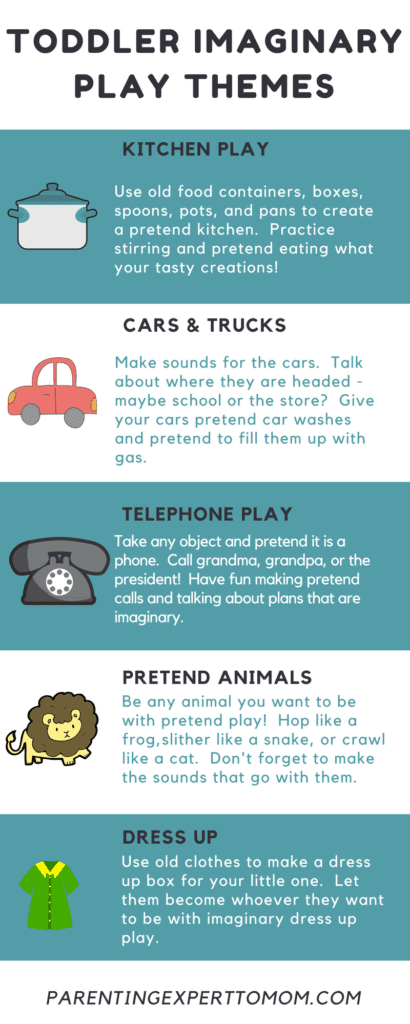(This post may contain affiliate links. To read our full disclosure policy click here.)
Put down the tablet and turn off the television. If you really want your baby and toddler to learn, teach them how to participate in imaginary play. This amazing and fun activity is packed full with learning opportunities in all areas of development including: cognition, communication, motor, self-help, and social emotional.
Let’s take a look at each area and see what skills your toddler picks up while playing pretend!

Cognitive
Whether you choose race cars or give your baby doll a bath, your toddler’s brain is building new connections when they start to pretend play. They learn to be creative and think outside the box when they create their own imaginary play sequences.
Problem solving skills are sharpened during pretend play as your little one has to look at ways to use their surroundings to support their ideas. This could mean making a garage for their car out of books and wooden blocks or covering their baby with a towel because there is no blanket near by.
Language
One of the best parts of pretend play is all of the rich language opportunities. This activity allows your little one to explore all categories of words:
- Verbs or Action Words (running, jumping, drinking etc.)
- Nouns or Object Words (cup, ball, baby, etc.)
- Adjectives or Descriptive Words (hot, cold, color names, etc.)
It teaches them to combine new words into short phrases to convey a message. They get repeated practice of words in play themes which will allow their speech to become more clear over time.
Receptive language skills (understanding of language) improve as your little one follows directions from playmates during cooperative imaginary play. As they gesture or talk to one another they get practice using communication skills with other children in a turn taking manner.
Motor
Gross motor skills are practiced while your child crawls on the floor while pretending to be a cat or dog. They build strength in their legs when hopping like a frog.
Fine motor skills are learned when your little one stirs his spoon while pretend cooking. They learn to imitate new motor skills by watching their peers or parents pretend play and try to copy the actions.
Not only is motor imitation important to learn new motor skills, it can also help build language skills because imitation is the first step in language development. It is much easier for a baby or toddler to imitate a physical action than a word which makes it a great starting place for learning imitation. We can also help toddlers imitate an action by using gentle hand-over-hand assistance to help them learn the action.
Social Emotional
Pretend play allows little ones to express themselves in a way that no other type of play does! They can pretend to be happy, mad, or sad which gives us a perfect opportunity to talk about emotions with them.
It opens up opportunities to for cooperative play with other children or adults. Skills are learned because imaginary play forces children to problem solve with each other to complete their ideas. Children working together to build a castle made of blocks is a perfect example of how cooperative play looks.
Self Help
Your toddler can practice many skills that they will need to become more independent within imaginary play. When your toddler is playing dress up or putting on their baby doll’s clothes they are practicing the skills needed to become independent when getting dressed and undressed. This is the perfect no-pressure situation in which your little one can take on and off their shoes (or your high heels) and try to zip and unzip a raincoat.
Frequently Asked Questions
How young can a child start participating in imaginary play?
There are many ways that you can introduce imaginary play to even…babies! Think about games like pretending to use the telephone to call grandma or pretending your hand is a spider as it crawls across the bed. These are simple ways to start modeling “imaginary” play to babies and young toddlers. When they are banging pots and pans on the kitchen floor get down with them and pretend to take a sip of that tasty stew they just made.
What are the best toys to buy for imaginary play?
One of the best things about imaginary play is you can use most regular things you have around your house…or nothing at all…we are pretending after all! Keep old food containers (cleaned out of course) and boxes to make a play kitchen or store for your little one. Use the pots and pans you already have to do pretend kitchen play.
Where should we do this?
The great thing about imaginary play is you can do it almost anywhere! Whether you are at the park or in the sandbox you can turn any situation into an opportunity to pretend.
I am not the most creative person…can you give me some examples of imaginary play?
Sometimes we can feel a little silly trying to pretend play with our little ones. Here are a few examples to get you started:

Make sure to stop by our Toddler Resource Page!
$('.ml-subscribe-form-5204729 .ml-block-success').show(); $('.ml-subscribe-form-5204729 .ml-block-form').hide(); };

Kayla O’Neill has a master’s degree in education as well as a bachelor’s degree in special education with an emphasis in early childhood education. She has been working as a developmental therapist with babies and toddlers in early intervention since 2012. She is also a mom with two young children.
Sachin Shah
Monday 20th of August 2018
Most people do not remember the significance of play these days. Most parents out there are eager to teach their kids a lot but not willing to spend enough time playing with the kid. This blog throws light on this aspect and I am happy to read about the same. Thank you for sharing this fabulous post.
Kaity | With Kids and Coffee
Thursday 22nd of June 2017
What a great breakdown! The self-help point is huge with my oldest daughter right now. She'll use imaginative play to work though everything from changing her dolls clothes to social situations that she experiences and it's amazing to watch the progress she makes after a few sessions of imaginative play.
Simply Mom Bailey
Wednesday 21st of June 2017
I love watching my toddler have imaginative play. I'm far from creative myself, but we leave open ended toys around the house and he figures it out. I'm never quite sure what he's doing with his trucks and blocks, but he's definitely experimenting, learning and growing.
audriaallred
Wednesday 21st of June 2017
Super great info. I love it when my toddlers pretend. It can be so fun to watch!